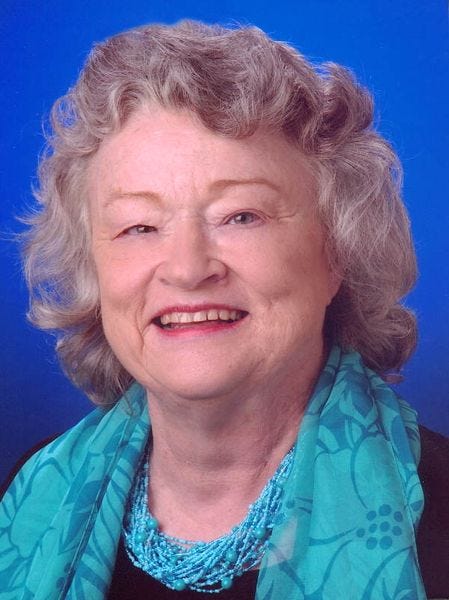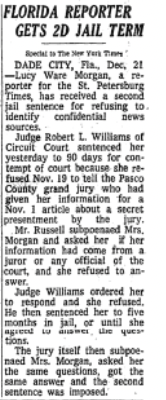Florida journalists don’t have to, thanks to Lucy Morgan who 45 years ago faced down the Florida courts while standing up for the First Amendment
The indomitable Lucy Morgan. Credit: Florida Women’s Hall of Fame.
They are called “shield laws.” Almost every state has some form of one providing for either “qualified” or “absolute” privilege. The laws are designed to preserve the relationships journalists have with their sources and to prevent a situation where a source could be intimidated — or worse — by the government because of the information they shared with the press.
Scrolling through my Facebook yesterday I discovered that it was the 45th anniversary of one such major media law decision, specifically Lucy Morgan v. State of Florida. Growing up in Florida and working in the state as a journalist for a while, I follow the Florida Supreme Court Facebook page. Here’s the issue: St. Petersburg Times’ reporter Lucy Morgan had been convicted of criminal contempt by a lower court because she refused to name confidential sources in a news investigation during (and after) Grand Jury proceedings in a corruption case in Dade City, Florida.
New York Times Archive, December 22, 1973.
Under her byline, on November 1, 1973, the Pasco Times published a synopsis of grand jury findings, which had been investigating charges of official corruption in Dade City. The day the article was published the state attorney questioned Morgan as to the source of information that informed her testimony. She declined to answer, so the state attorney secured a contempt conviction and five month jail sentence, all within twelve hours of the article’s publication. The conviction stood for three years while Morgan appealed.
Thankfully, Justice Joseph Hatchett of Florida’s highest court wrote the opinion reversing her conviction and issued it on July 30, 1976. (There was a lot of patriotism to celebrate that year).

Lucy Morgan, with camera and cordless phone in 1985. Credit: State Library and Archives of Florida.
Hatchett decided what journalists hoped he would: The First Amendment protects reporters from certain kinds of government coercion. Specifically, the government does not have the power to “force a newspaper reporter to disclose the source of published information, so that the authorities can silence the source.” More than four decades later, that’s the law in Florida.
Three years. That’s how long it took for Morgan to get that conviction overturned. A stress not lost on her kids wondering when mom was going to jail. Her actions, defiance, perseverance and character continues to protect generations of journalists today.
How many of us can say that 50+ years into our passions we are still so relevant and impactful and willing to take that kind of risk?
Lucy Morgan is a Truth-Seeker. Pulitzer Winner. Investigative Journalist. Bureau Chief. Mom. Wife to career newspaper editor Richard Morgan. Cat Lady. Shero. Friend. Of all the titles bestowed in her lifetime, I think temporary “jailbird” might be my favorite.

Lucy Morgan toasting her freedom and the freedom of the press. Reprint, Florida Supreme Court.
She is also the subject of a scripted feature screenplay in progress I am writing. I’m happy to see this photo of her toasting along with this remembrance. That same year — 1976 — was the year I moved to Dixie County as a child. Who knew just 5 years later our paths would cross in that secretive, tiny town. She would arrive on the scene, having firmly positioned herself as a defender of truth. She would become my childhood shero and the reason why I became a journalist. Forty years later this past March, we met again for the first time as adults and I got to thank her for being the kind of journalist we can still look up to — still practicing that daily integrity — with the twinkle of an almost jailbird’s eye.


